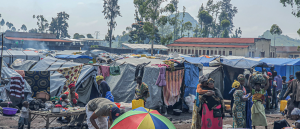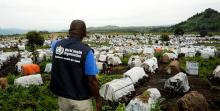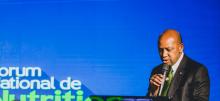Palais briefing – 22 September 2023, With Dr Boureima Hama Sambo, WHO Representative to the Democratic Republic of the Congo
Eastern DRC’s crisis devastating lives of millions and putting the health system on the brink.
- Increasing violence from armed conflict and intercommunal clashes, with entire villages being burned to the ground.
- Forced displacements, leaving millions of people in precarious conditions without shelter, food or means of survival.
- Devastating floods and landslides, hampering further the delivery of aid.
- All these factors rising the risk of deadly outbreaks of measles, cholera, malaria, COVID-19, polio, meningitis, mpox, plague.
- Attacks on health care hampering the delivery of health services on the ground.
- And rampant sexual and psychological violence
These are all the challenges that people in Eastern DRC have to face on a daily basis. Although the country is battling an unprecedented humanitarian crisis over the past three decades, the eastern side of the country is severely affected due to the intensity of the conflict and the increasing humanitarian needs.
You may have heard recently other partners briefing on various aspects of their work in DRC and I am here today to talk about WHO’s health response in six of the eastern provinces.
Within this increasing difficult context, you can imagine how challenging it is for humanitarians to make a difference. Nevertheless, WHO is committed to serve the population and among all the aspects of our response, let me give you three key areas of our response in Eastern DRC:
- Protecting IDPs’ health
WHO is one of the main actors present in the forgotten Tshopo province and one of our priorities is to support displaced communities on the ground with a no regret policy.
At the Konga-Konga where over 5000 displaced people are gathered, we recently finalized the installation of water points, latrines, and solar panels. People were previously surviving with only 1.5 litre of water per day and women forced to seek water and food outside the site, putting them even more at risk of sexual violence. WHO has also facilitated access to free health services for displaced people on site, through health facilities.
- Disease outbreaks surveillance and response
DRC is facing its worst cholera outbreak since 2017. The eastern provinces are the most affected one’s accounting for 80% of the cases with close to 30,000 suspected cases of cholera reported.
The country is also battling the largest epidemic of measles recorded since 2019. The combination of measles and malnutrition has severe health impact on children under 5 years of age, putting them at risk of dying with lack of access to adequate treatment.
WHO has deployed experts to the affected areas to support the authorities in investigating and responding to these outbreaks, delivered medical supplies for cholera treatment, supported transportation of samples to labs for testing, and built treatment centers to make sure more people affected with cholera can get treated on time.
WHO has recently completed a vaccination campaign in Ituri province reaching over one million of children under 5, for a vaccination coverage of 88%. More vaccination campaigns will follow in other provinces, including in Kasaï and Mai-Ndombe.
- Gender-based violence
Finally, I will mention our support to victims of gender-based violence. Around 23,000 cases of gender-based violence were reported in the six provinces from January to August 2023. These numbers are probably much higher, considering the low reporting by the victims and the weakness of the system to capture this data in a more exhaustive way.
We are focusing on increasing health services to the victims, including access to mental health and psychosocial support, medical care, and Post-Exposure Prophylaxis. Two WHO mental health experts have been recently deployed to strengthen the delivery of these services in North Kivu and Tshopo.
Based on hard lessons learned, we strive in our work to actively prevent sexual exploitation and abuse of the vulnerable population.
Call for action!
Since the UN-wide scaled-up response, a total of more than 2.7 million people were reached for the scale-up period from June to August by the health cluster partners led by WHO.
But DRC must not be forgotten.
We need more than ever the support of our donors and partners to continue delivering these much-needed health services to the people of DRC.
WHO’s response is only 14% funded so far. We need a more sustainable and resilient health response in Eastern DRC.
Additional information
Key figures
- A total of 7.4 million people in DRC are in need of health assistance and the situation is deteriorating.
- Some 6.3 million people have been displaced in the last 18 months in Eastern DRC, including one million forced to flee in the last 6 months, which are left more at risk of disease outbreaks and acute malnutrition with limited or no access to food, safe water, and health care.
- In the last weeks, floods, and landslides in South Kivu, Kasaï and Tshopo affected over 230,000 people and caused 526 deaths.
- While eastern Congo has decades of conflict, neighbouring Tshopo province has witnessed a concerning escalation of violence, killings, and displacement, exacerbating the ongoing conflict in the region. From February to July 2023, acute communal conflicts caused more than 127 deaths and led to the movement of more than 100,000 internally displaced. Last month, six villages were completely devastated following intercommunity clashes, leaving no less than 11,000 people in need.
- Supplies recently provided:
- In Tshopo, WHO delivered 4 tons of essential medicines to ensure that 3000 people can get treated at the Konga-Konga displacement site.
- We’ve also delivered 15 tons of supplies for cholera treatment to North Kivu and send rapid response teams of the ground to disinfect health centres and households.
- Attacks on health:
- The violence is hampering the delivery of health services on the ground. Health facilities are set on fire, health workers killed and facing constant physical and psychological threats, supplies looted. These attacks lead to partial or total interruption of health care delivery in the affected areas.
- WHO has verified 32 attacks in 2022, causing 3 deaths and 7 injuries, and 19 attacks so far in 2023, causing 8 deaths and 1 injury, 16 impacting health facilities, 11 impacting supplies. More data on the SSA.
Disease outbreaks
- Natural disasters are putting additional strain on the health system. Heavy rains hit the area, causing floods and landslides which swept away hundreds of houses and IDP settlements, and preventing vaccination teams from reaching the populations in need.
- Cholera: Since the beginning of 2023 and as of 10 September, over 29,000 suspected cases of cholera have been reported in the six provinces of Eastern DRC, including 121 deaths, comparing to only slightly over 5000 last year for the same period.
- Measles: Every two to three years, measles outbreaks affect tens or even hundreds of thousands of children in DRC. The largest epidemic was recorded in 2019, with over 300,000 suspected cases reported, including more than 6,000 deaths. Lack of access to vaccines and vaccination services exacerbate the situation.
- Since the beginning of this year and as of 10 September, close to 126,000 cases of measles have been reported in the six eastern provinces with 2169 deaths (CFR 1.7%), comparing to 15,000 last year and 166 deaths at the same period.
Funding
- WHO’s response:
- Total budget in the response plan: $31.3M
- Total received: $4.3M (14%)
- The gap: $26.9M (86%)
Communications Officer
WHO DRC
Tel : +243 81 715 1697
Office : +47 241 39 027
Email: kabambie [at] who.int (kabambie[at]who[dot]int)
Communications officer
Tel.: +41 22 791 5099
Cell: +41 793 676 214
Email: jasarevict [at] who.int (jasarevict[at]who[dot]int)


